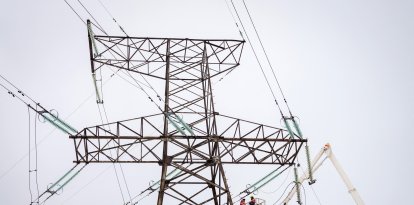East Coast faces extreme storm with strong winds and flooding
An atmospheric river and a potential bomb cyclone are developing. This combination could generate torrential rains, and unusually high temperatures, the National Weather Service (NWS) reported.

Flooding
The East Coast is under alert due to severe weather conditions caused by an atmospheric river and a possible developing bomb cyclone. This combination could generate torrential rains, intense winds and unusually high temperatures, the National Weather Service (NWS) reported.
In regions such as Maine, a "weather cocktail" threatens with freezing rain, downpours and gusts up to 60 miles per hour (97 kilometers per hour), said Derek Schroeter, NWS meteorologist. Precipitation could accumulate two to three inches, and strong winds will extend into Wednesday night, with risk of flash flooding and possible power outages.
The main driver of this storm: an atmospheric river
The main driver of this storm is an atmospheric river (a stream of water vapor carrying moisture from the tropics northward). This phenomenon is capturing moisture from the Atlantic Ocean and directing it toward New England, intensifying adverse weather conditions. As Schroeter explained:
"This is a multifaceted storm (...) temperatures could quickly rise to unusual levels for this time of year, increasing the risk of overflows in streams and rivers."
">⚠️💧 Heavy rain and flash flooding are expected in the Mid-Atlantic and Northeast on Wednesday. The highest flood risk will be in New England where locally heavy rain and rapid snowmelt will contribute to flooding and significant river flooding may be possible. pic.twitter.com/Bqi8mRcxr8
— NWS Weather Prediction Center (@NWSWPC) December 10, 2024
In Vermont, a flood warning will be in effect from Wednesday afternoon through Thursday morning. The city of Montpelier urged residents to protect belongings in basements and low-lying areas prone to flooding while it monitors water levels in coordination with local authorities.
In New Hampshire, the Mount Washington Avalanche Center issued a special bulletin Wednesday for the Presidential Range, which received significant snowfall over the past two weeks.
Be prepared for unpredictable conditions
Meteorologists also warn that the storm could experience bombogenesis, a rapid intensification process that turns a weather system into a bomb cyclone, increasing the possibility of extreme rainfall and more intense wind gusts.
Experts have reiterated the importance of being prepared for unpredictable conditions, especially in areas prone to flooding or with vulnerable infrastructure. With temperatures that could reach 15 degrees Celsius (50 degrees Fahrenheit) in the middle of the storm, there is an additional risk of snowmelt that would exacerbate flooding.
The National Weather Service advises residents to avoid unnecessary travel during peak impact hours and to stay informed through official channels. In addition, they suggest keeping emergency kits with basic supplies, especially in areas where power outages are more likely.

























